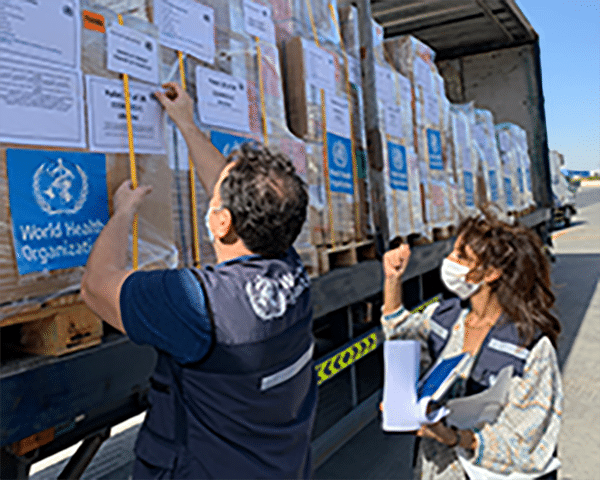This is not an ordinary cargo, it carries life-saving medical supplies destined for Ukraine.
On Saturday 5 March, just over a week following the escalation of military operations in Ukraine, 3 large lorries carrying 36 tonnes of vital WHO medical supplies crossed the Polish border into Lviv, where they were stored and then distributed to health facilities across Ukraine, including to the capital Kyiv.
The supply chains for medicines, medical supplies and common goods have been severely disrupted in Ukraine, creating urgent need. Many distributors are not operational, and many government and humanitarian stockpiles are inaccessible due to ongoing military operations. Life-saving and essential medicines (such as oxygen and insulin), personal protective equipment, surgical supplies, anaesthetics and safe blood products are reportedly in short supply. WHO has been working with partners to alleviate some of these shortages.
Getting the supplies to Poland
Coordinating the logistics for this shipment and making sure it gets to its destination has been no small feat – taking 5–6 days from dispatch in Dubai to arrival in Lviv.
Robert Blanchard, Team Leader for Emergency Operations explains: “Here at WHO’s global logistics hub, based within Dubai’s International Humanitarian City, medical supplies and equipment are prepositioned, stored, and rapidly dispatched in response to health emergencies all over the world. We are currently working around the clock to send medical supplies to Ukraine. WHO maintains a diverse array of life-saving health commodities, including trauma and emergency surgery supplies that contain items such as essential medicines, sterile surgical instruments, bandages, paracetamol and disinfectants. We also dispatch support equipment such as generators, which are critical for mounting an effective emergency response”.
The supplies arrived in Poland by cargo plane on 3 March, travelling a distance of over 6200 km from the hub in Dubai. The 36 tonnes of medical aid and trauma supplies will meet the urgent needs of 1000 people requiring surgical care and provide medical provisions to help treat 150 000 people.
Making sure the supplies reach those in need
A priority health concern has been the worsening of conflict-related trauma and injuries, which could occur as a result of lack of access to health facilities and life-saving medicines and supplies.
“We have surgical supplies to treat wounds, as well as medicines for all other diseases that do not stop for war. More supplies are expected in the coming days,” commented Flavio Salio, WHO Emergency Medical Teams Network Leader.
Yet, getting these supplies to Ukrainian hospitals remains a problem, as Dr Jarno Habicht, WHO Representative in Ukraine, highlights: “These trauma and medical supplies must reach those who need them the most. For this to happen, we have to ensure safe passage because people’s health needs are increasing every day and every hour”.
Additional shipments planned and on their way
This was the first of multiple shipments planned to support people severely affected by this humanitarian emergency. A second shipment has arrived in Lviv for distribution to other parts of Ukraine, containing cold chain elements, such as fridges, so that vaccines and other medicines can be stored safely. The Dubai-based logistics team is also preparing more health supplies for a third charter flight, which will deliver an additional 40 tonnes of trauma and emergency surgery kits to enable hospitals to continue to treat injured patients and perform operations.
WHO’s continued support to Ukraine and neighbouring countries
WHO has released US$ 5.2 million from its Contingency Fund for Emergencies and will need to raise US$ 45 million for Ukraine and US$ 12.5 million to support neighbouring countries providing refugee care.
Ensuring the health and well-being of all people lies at the core of WHO’s mandate and commitments in all situations. WHO is working closely with its offices in Ukraine and neighbouring countries, through government and other health partners, to rapidly respond to the health emergency triggered by the conflict and to minimize disruptions to the delivery of critical health-care services.









